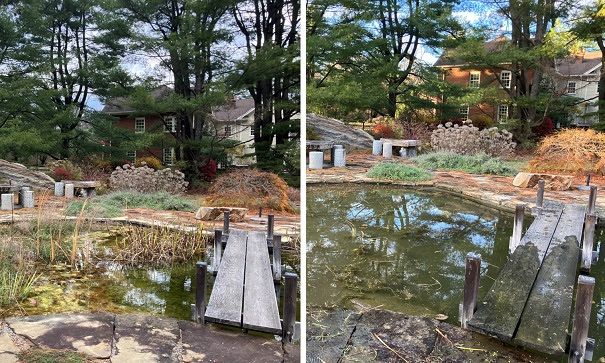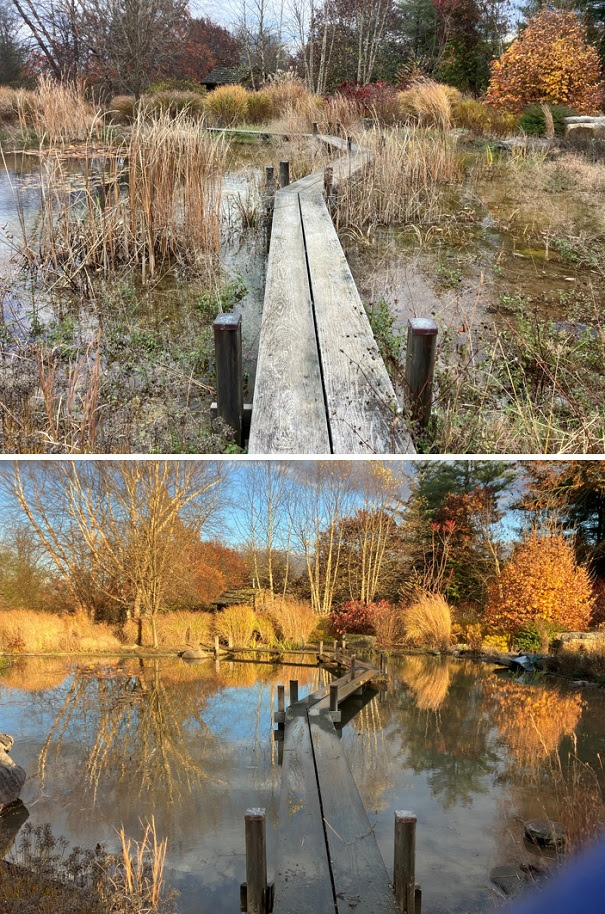Dear friends,
We would love to hear about your current BioNova® projects. Please send Ryan, ryan@bionovanaturalpools.com, any information and pictures of your projects and we will gladly put them in the newsletter to share with all of the dealers. Thank you and we hope to see your inputs soon!
Here’s what’s happening at BioNova® Natural Pools North America…
Winterizing Your Aquatic Plants
The has been a very mild fall and beginning of winter so far in the northeast. However temperatures are finally starting to get colder and freezing temperatures are on their way. It is at this time of year that clients with ponds and planted regeneration zones may have questions about their aquatic plants. Of course aquatic plant care will depend on where they live and how cold it gets during the winter. If the pond won’t be subject to freezing temperatures and frost, then everything can continue as normal.
Overwintering pond plants makes spring reopening easier, and keeps the plants and pond healthy. Water quality can be disrupted if plants die and breakdown in the water and it is very important to do both a fall and spring deep cleaning to remove plant debris. Repurchasing all new plants in the spring can be expensive when many aquatic pond plants can survive the winter as long as they are winterized correctly.
Once colder temperatures arrive and the plants have turned brown then the dead foliage should be removed and trimmed so there is only about two inches of stem above the soil/gravel. It is important that the roots and crown do not freeze during the winter, so it is important to make sure the plants are planted in an area where the water is deep enough that the temperature remains a few degrees warmer and does not freeze throughout the winter.
Tropical plants that originated in warm climates with very mild winters cannot survive freezing temperatures and need to be either moved indoors or treated as annuals and replanted in the spring when the water temperature has consistently risen to 70 degrees or more. Floating plants are often very delicate, and will die once the surface water freezes.
It’s important to remember that proper winter pond plant care will help with water clarity and an easier spring reopening. All debris and trimming should be removed and if tropical and floating plants are left in the pond, they will sink to the bottom of the water and slowly begin to decay. The beneficial bacteria are not as active in cold temperatures, so the plant parts are not broken down efficiently. The excess nutrients can harm pond life and lead to an algae bloom in the spring when the weather warms.
We hope this information is useful and hope that everyone is staying safe as we proceed closer to the holiday season.



Stay Safe and Healthy.
We hope you all continue to stay healthy during these trying times and wish all of our BioNova® Dealers our best to you and your families.

Questions, Concerns, Thoughts
As always, we encourage you to contact us and share your thoughts, questions, and concerns with BioNova®. We are available to assist you in any way we can. Feel free to email me directly with photos, project updates, testimonials, etc., and we’ll include them in an upcoming Newsletter.
Respectfully,
Ryan Harmer
BioNova® Natural Pools
ryan@bionovanaturalpools.com
609-318-4707

